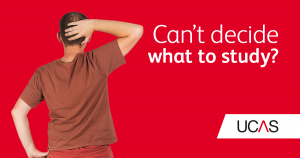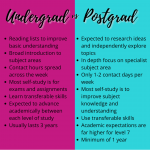If you’re thinking about applying for a postgraduate degree, then you already understand what it’s like to study at a university and the general application process. There are a few key differences between an application for an undergraduate and a postgraduate, however. For a postgraduate course, you can study either a taught related course or a research related course. A taught course is set out similarly to an undergraduate programme, made up of modules, scheduled into a timetable of seminars, lectures and activities. You’ll be led through the taught sessions by your academic team.
A research master’s degree is more independent ly taught. There are fewer timetabled units, if any at all and your focus will be on one or more research projects that is primarily your own work. Your academic team will offer you support, guidance and tutorials, however the final project you produce is based on your own independent research.
ly taught. There are fewer timetabled units, if any at all and your focus will be on one or more research projects that is primarily your own work. Your academic team will offer you support, guidance and tutorials, however the final project you produce is based on your own independent research.
Choosing between either is your first step, and it entirely depends on your career aspirations. If you have a professional role in mind, such as a social worker or a nurse, you may wish to study a taught course that allows you to register as one of these once you’ve graduated. If your goal is to further your knowledge in the field of academic research or you have a career aspiration where research skills are valuable and add to your expertise in the role, then you may wish to consider a master’s in research. Alternatively, a taught master’s is valuable for those wishing to acquire more knowledge in a particular subject area, for example, I am studying Social Work BA Hons, and am looking at gaining more knowledge into Domestic Violence or Substance Use, therefore a taught master’s following these modules would be of interest to me and enhance my knowledge for my career.
Once you have decided what course is the right fit for you, you may be thinking about applying. I am in the process of attending postgraduate open days and contacting academic teams to find out more information. It’s important you also ‘interview’ the university/academic team to find out if the course is a right fit for your future goals. Masters are often more flexibly taught than undergraduates, due to the nature of mature students applying. You may be looking to find a course that is taught online or as a blended approach, and therefore mixes practical face to face sessions as well as online to fit your lifestyle. This was the first thing I considered, as a mature student, I have commitments in my hometown that mean I cannot just move away to university as I once had the opportunity for as an undergraduate. You’ll notice there are several options usually for each course and masters are often offered part time also.
From my experience of open days and reaching out to the academic teams of the postgraduate courses I am considering, the most common piece of feedback I’ve heard about the application is, it is more personal than an undergraduate one. At postgraduate level, the team want to hear who you are, why you want to study this course, and how it’ll benefit your future career goals. They are now less interested in your outside hobbies that you may have mentioned in an undergraduate application. It’s important to mention how this course will lead you to your next steps in your career aspirations and what you hope to gain from it.
Most postgraduate degrees ask for a 2:1 or above at first degree level, however it is becoming more frequent that certain universities and courses are offering places at a lower second-class honour degree. Some masters will offer interviews, also. For an upcoming one I have, the academic team commencing my interview have advised me it is an informal interview by telephone to discuss how useful the masters programme might be to the applicant’s career aspirations to make sure that I am making a logical choice that’ll benefit my future. The experience can vary depending on where you apply, however, one I recently attended consisted of just 3 questions about my goals, where I hope the postgraduate programme will take me and what is my current experience in the field.
 When applying, the deadlines are different to an undergraduate course also. You can apply any time from September the year before, until around about July before you start the course, however this varies per university depending on limitations of spaces available. Some institutions also have a January intake which is worth bearing in mind. One piece of advice given to me by a member of an academic team was to apply as early as possible and to accept the place, as it is easier to defer or change your mind nearer the time, than to apply late and miss out, altogether. Another key difference is how you apply. There are some postgraduate programmes available to apply through UCAS, but many universities have their own portal system to apply via their website. This is worth noting, as most the information for the course, eligibility, course leads, modules, student feedback, fees and application process can be found on the university’s webpages.
When applying, the deadlines are different to an undergraduate course also. You can apply any time from September the year before, until around about July before you start the course, however this varies per university depending on limitations of spaces available. Some institutions also have a January intake which is worth bearing in mind. One piece of advice given to me by a member of an academic team was to apply as early as possible and to accept the place, as it is easier to defer or change your mind nearer the time, than to apply late and miss out, altogether. Another key difference is how you apply. There are some postgraduate programmes available to apply through UCAS, but many universities have their own portal system to apply via their website. This is worth noting, as most the information for the course, eligibility, course leads, modules, student feedback, fees and application process can be found on the university’s webpages.
Applying for your postgraduate degree is a big step, especially when considering the cost of each varies significantly, so, consider this also when deciding which course is the right fit for you. Overall, it helps to do as much research as early as possible, attend open days, chat to current students and don’t be afraid to reach out to the course leads, they also want to help you find the right fit for you! Remember, you can always apply for more than one course, just tailor your application to suit the needs for the programme and keep an up-to-date CV available as this is important for the process. I hope this helps to break down some of my personal experiences when deciding upon a postgraduate programme and university. I wish you all the luck with choosing the right course for you and with the application.

 My undergraduate to postgraduate journey at BU
My undergraduate to postgraduate journey at BU Why I returned to BU for my postgrad degree
Why I returned to BU for my postgrad degree My undergraduate to postgraduate BU journey
My undergraduate to postgraduate BU journey








